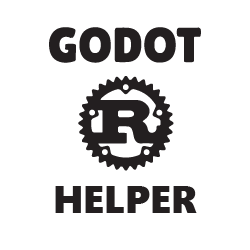

A simple CLI tool to help you create and update Rust modules for your Godot projects.
bash
$ cargo install godot_rust_helper
To upgrade:
bash
$ cargo install --force godot_rust_helper
For each game you create in Godot you will have to create a new library. The library itself is a cargo library and it holds all of the modules used in your game.
To create the project's library, navigate to where you would like to store the modules (outside of your Godot project directory) and use the new command:
bash
$ godot_rust_helper new <destination> <path_to_godot_project> [options]
Let's go over the arguments and options in detail with some examples.
Arguments:
cargo new so you should abide by the cargo project naming standards.Options:
- --targets Native modules in Godot can target multiple platforms and godotrusthelper needs to know ahead of time what platforms you plan to target your modules for with the available options currently being: windows, linux, and osx. For example if you are targeting Windows and OSX, you need to have have cargo set to build a dll and a dylib file and you would pass --targets=windows,osx as the targets. By default if no targets are passed then just --targets=windows will be set.
examples:
Creating a default library for Windows only builds:
bash
$ godot_rust_helper new breakout_modules ~/Documents/projects/breakout
Creating an library for Windows, Linux, and OSX builds:
bash
$ godot_rust_helper new breakout-modules ~/Documents/projects/breakout windows,linux,osx
Note: The src/lib.rs file is completely managed by godotrusthelper and should not be modified. Any modifications to the file will result in the modules not functioning properly or they will be overwritten when a module is created/destroyed. Custom mods can be added to the file (coming soon).
Note: Each instance of the library comes with godot_rust_helper_extensions as a dependency which is going to contain methods to make things easier (such as getting typed nodes) and include methods that are not a part of gdnative but are in gdscript. You do not have to use any extensions if you don't want to but if you are interested in them, check out the extensions here.
If you are getting an error that says that the crate doesn't exist it's because the name of the extension was not right the first time around and it was fixed 1.0.2. To fix it you can update and create the library again or simply go to your Cargo.toml and change godot_rust_helper_extensions to godot_rust_helper_ext.
Now that you've created the library, you can go into the newly created folder and see the config file. This config file contains the path to the Godot project directory and the targets passed from the new command. This config file should not be modified manually as godotrusthelper depends on it heavily.
From this directory, we can now begin to make modules with the create command like so:
bash
$ godot_rust_helper create <class_name>
What this does is create a src/<name>.rs file for the module and adds an entry for it in the src/lib.rs file. If you attach this script as it is to a Node and run the game then "hello, world" will print to the godot console.
Note: This command has to be run from the library's directory.
examples:
bash
$ godot_rust_helper create Player
bash
$ godot_rust_helper create HUD
After you have created your module (or you can do this with the default contents to try it out) you're ready to run a build using:
bash
$ godot_rust_helper build
What this does is first run cargo build and then it moves the build files into the Godot project directory.
Note: This command has to be run from the library's directory.
Note: The first time you run this it will take a while as it have to reach out and download the necessary dependencies, every build after that will be much quicker.
The build command also supports the --watch option which will watch the src directory of your module for changes and re-build it automatically.
examples:
Running the build command:
bash
$ godot_rust_helper build
Running the build command and watching for changes to any modules in the library.
bash
$ godot_rust_helper build --watch
The last step that has to be done to use your module in your Godot project is creating the script and attaching it to the node that needs to use it.
After you have created a module and run a build, you can attach the script to a node like so:
godot_rust_helper create which is the class name of the Rust module you created.godot_rust_helper new.Now if you run your game you will see your script's functionality up and running!
Note: If you update your Rust module you do not have to update the corresponding .gdnlib file in Godot, it will be updated automatically.
The following are commands are situational but are not needed for the basic setup.
Removes a Rust module from the library. You will still need to remove the script reference from your node in Godot as it will throw an error if you attempt to run the game since the script no longer exists.
bash
$ godot_rust_helper destroy <class_name>
godot_rust_helper create.examples:
bash
$ godot_rust_helper destroy Player
bash
$ godot_rust_helper destroy HUD
Changes the path of the project, godot project directory, and optionally the targets in the config if you cloned/downlaoded the project from elsewhere.
This command has to be used from inside the project you want to rebase.
bash
$ godot_rust_helper rebase <path_to_game> [targets]
examples:
bash
$ godot_rust_helper rebase ../path/to/game
bash
$ godot_rust-helper rebase ../path/to/game --targets=linux,osx
bash
$ cargo test -- --test-threads=1
MIT